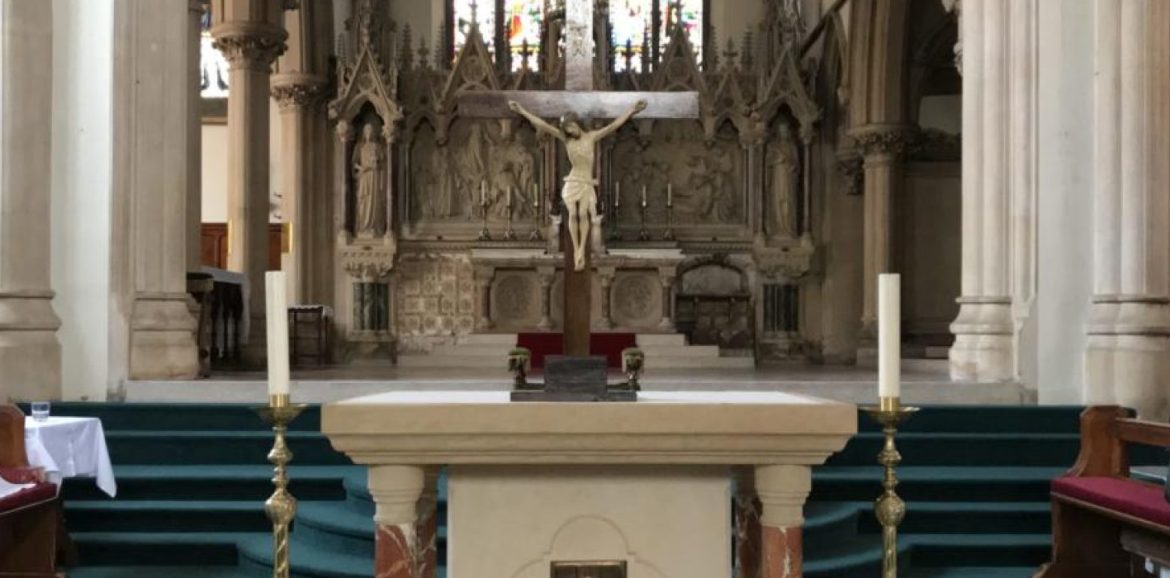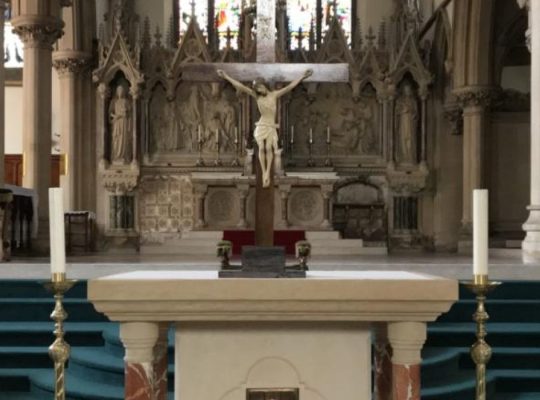Just a Thought.
One week is a short time to meditate on the word proclaimed last Sunday or to revise one’s life accordingly. Hence the liturgy, without repeating itself, pursues the same thorny issue of money, and how we serve it or make use of it as skillful managers. Thus, we read the last part of Chapter Sixteen of Luke’s Gospel, dwelling now on the second panel of the diptych that displays the sequence formed by the Twenty-Fifth and Twenty-sixth Sundays of Ordinary Time, Year C.
The parable of the rich man and the beggar Lazarus, that we see today is very well known. Like the parable last week, it is proper to Saint Luke. Jesus, though, did not wholly invent it. One finds in rabbinic literature a similar Jewish story told in various forms, which is itself based on an older Egyptian story. But the Gospel adaption nonetheless witnesses to a beautiful originality and is marked also by its simplicity. “There was a rich man…..and a poor man.” Nothing distinguishes them other than the difference in social status. We do not hear of a “wicked” rich man or of a “holy” poor man. The latter does, it is true, have a name. The fact is worth noting, for there is no other like case in the Gospel, Jesus calls him Lazarus, a name that suits him well. It means “God has rescued” (El’azar) (The name Lazarus here, is a symbolic name rather than one of a particular person. This person here has nothing to do with the friend of Jesus, Lazarus the brother of Martha and Mary).
The rich man does nothing evil: other than he lives like a rich man, wears fine clothes, and throws sumptuous feasts every day.
Lazarus “lies” before the door, covered with sores. He “would gladly have eaten his fill of the scraps, that fell from the rich man’s table. Dogs even use to come and lick his sores.”
This can be seen every day even in our own country, in shop doorways or park benches etc. Lazarus does not beg. Doubtlessly, he does not have the strength to rummage through the rubbish bins for the scraps of the rich man feasts. He waits for death: it, sure enough comes. And also, for the rich man. He [the rich man] is buried “with many lamentations.” Perhaps even “the whole city stopped working to honour him.”
For Lazarus, there is nothing of the sort. He is undoubtedly thrown out of the city “rolled up in a sack, all alone, with no-one following him.” But the parable says nothing about these funerals. It simply recounts that the angels bear the poor man to Abraham. It is solely interested in what happens later, in the afterlife. Thus comes two scenes, punctuated by two speeches of Abraham who draws the lesson from the parable.
The first scene is a radical reversal of the situation. To speak in the harshness of the text, the rich man is tortured. For he sees Abraham and Lazarus with him. And he pleads: “Father, Abraham, have mercy on me. Send Lazarus to dip the tip of his finger in water and cool my tongue.” Now we hear Abrahams first speech: “Child remember that you in your lifetime received your good things and Lazarus in like manner bad things; but now he is comforted here and you are in anguish.” Abraham is saying, in effect: ”Too late! Yesterday, if you had been a neighbour to Lazarus, you would have made a friend of him and he would have welcomed you to the eternal dwelling place. — And that is not all, between you and us there is fixed a great chasm. In order that those who would pass from here to you may not do so, and none may pass from there to us. You no longer have your ‘elusive wealth’. Lazarus can do nothing for you. How was it that you did not see the plea in the eyes of the poor man who lay at your gate, or understood that you were fixing your own fate? Could you not read the parable at the right time?”
But let us not misunderstand the Gospel. Death does not invert the world so as to establish an equilibrium. He is a fool who grows rich for himself instead of growing rich in what matters “to God.” The Christian ought not be surprised, he who has heard the proclamation: “Blessed are you who are poor, for the Kingdom of God is yours. Blessed are you who are now hungry, for you will be satisfied…… But woe to you who are rich, for you have received your consolation..… But woe to you who are filled now for you will be hungry.” (Luke 6:20-21,24-25) And also: “If you are not trustworthy with dishonest wealth, who will trust you with true wealth? If you are not trustworthy with what belongs to another, who will give you what is yours?…… You cannot serve both God and mammon.”
Today’s Gospel does not merely mean to remind us of this: it is above all a call to conversion that becomes more and more pressing in this life. This is precisely what is at issue in the second scene of the parable, which is not contained in the older Egyptian and rabbinic accounts. All the more does it demand our attention.
Jesus says that the rich man, understanding the futility of any further insistence, is preoccupied with those he has left on earth: his five brothers who are in danger of blindly rushing to the same fate as belongs to him. He begs that Lazarus might be sent to warn them, causing them to abandon their careless ways, which might lead to their conversion.
From someone on the other side of the great abyss, this request is more surprising even than the preceding dialogue. But their only purpose is to lead to Abraham’s second speech, which summarizes the parable and its teaching: “They have Moses and the prophets…. If they will not listen to Moses and the prophets, neither will they be persuaded if someone should rise from the dead.” Is this a nod to the resurrection of Christ and the refusal of many of the Jews to believe it? The expression “Moses and the prophets” in Luke denotes the Scriptures. It evokes the whole of the revealed message, the “living utterances.”
The rich man’s request partakes of the same illusion suffered by many people still today: that a clear, irrefutable “sign from heaven” will make all the difference. It is an illusion, for as we well know, the miracle itself is only convincing to faith; and Scripture must authenticate it, not vice versa.
With a heart and mind impervious to faith, one cannot perceive the true significance of the most plain of signs. Some will say about Jesus himself: “It is by the power of Beelzebub the prince of demons, that he drives out demons.” But we know that not to be so.
Besides,”someone” is raised from the dead: Jesus himself. But this resurrection, the supreme sign, is also the object of faith and, as we proclaim in the creed, it is in “fulfilment of the Scriptures.” There is no way around this. We must hold with the Scriptures, the sure and only means to come to faith, and with the Word, the efficacious incitement to conversion. The miracle par excellence, the resurrection of the Lord, becomes a sign only for the one who listens to “Moses and the prophets” and the one who has fulfilled them, Jesus; for these Scriptures culminate his teaching. The Gospel teaches us with extraordinary power and authority how to make the proper use of money and how to avoid being led by it into catastrophe.
Chapter sixteen of Luke’s Gospel forms the underlying unity of the sequence of the Twenty-Fifth and Twenty-Sixth Sundays. In two parables, this chapter gives a particularly clear and strong teaching on the use of money and the privilege of the poor.
All three synoptics report the hard saying of Jesus: “It is easier for a camel to pass through the eye of a needle than for a rich person to enter the kingdom of God.” Both in Matthew and Luke, the beatitude of the poor comes first. For both, the announcement of the Good News to the poor characterizes Jesus’ mission. And both also report that one must choose between serving money and God.
Nevertheless, Luke is the herald par excellence, the one who proclaims the privilege of the poor: the ‘Magnificat’; the misfortune of the rich as compared to the beatitude of the poor; the repeated call to renounce riches, and to share them.
One must have these teachings in mind when one reads Chapter Sixteen, which insists on remaining mindful of death in order to teach how money is to be used in an intelligent and prudent way, so as to make friends against the time when one’s wealth will have to be abandoned. The Gospel is particularly well set forth and emphasized against the background of the Liturgy of the Word these Sundays. The prayer of intercession is intended for the salvation of all, and it implores God particularly for those who exercise responsibility in society and the state. It is a profession of faith in Jesus Christ as the one mediator, in line with the baptismal profession of faith.
This sets the field for a “beautiful fight” that makes the Christian life an incessant search for justice and uprightness in relations with others and with God.
How could one then make a god of money, of mammon?
We must listen to the warnings of the prophets and the fathers of the Church, and also the contemporary visionaries, for they perpetually rouse our consciences in a very timely manner.
“Jesus Christ was rich, but he became poor for your sake, to make you rich out of his poverty.”
“So, store up treasure, that will not fail you, in heaven!”


